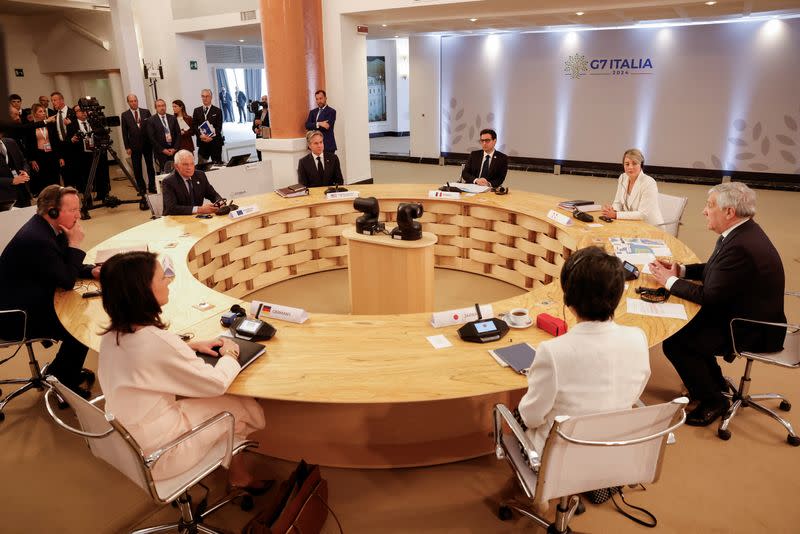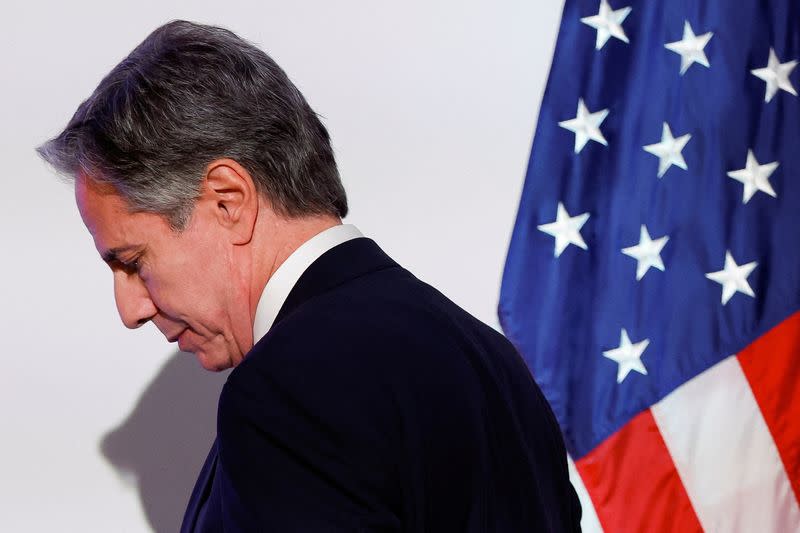G7 pledges swift aid for Ukraine, seeks to calm Middle East
By Crispian Balmer and Angelo Amante
CAPRI, Italy (Reuters) -Group of Seven (G7) major powers pledged on Friday to bolster Ukraine's air defences to counter increasingly deadly Russian attacks and told China to stop supporting Moscow's military industry if it wanted good relations with the West.
Foreign ministers from the G7, comprising the United States, Italy, Canada, France, Germany, Japan and Britain, wrapped up three days of talks on the island of Capri that were dominated by wars in Ukraine and the Middle East.
They acknowledged they had to do more to help Ukraine, which is struggling to hold off stronger Russian forces, and urged de-escalation in the Middle East, where the deep enmity between Israel and Iran risks triggering a wider regional conflict.
But the ministers also said the multitude of global crises was pulling leading democracies closer together.
"We emerge from this meeting of the foreign ministers more united than ever," said U.S. Secretary of State Antony Blinken.
Alarmed by growing Russian momentum on the battlefield, Ukrainian Foreign Minister Dmytro Kuleba came to Capri in person to tell G7 allies that they needed to send more aid, saying wars in his home country and the Middle East were linked.
Iran supplies Russia with the same type of armed drones that were used last week as part of its large-scale attack on Israel.
"The narrative that the West has to choose between supporting Israel or Ukraine is wrong because these are two theatres of the same war," Kuleba told reporters.
The G7 said in a statement it would increase security assistance for Kyiv, specifically bolstering "Ukraine's air defence capabilities to save lives and protect critical infrastructure".
Two years after launching its invasion, Russia has been targeting key Ukrainian energy infrastructure, killing hundreds of civilians in its strikes. Russia says the energy system is a legitimate target and denies targeting civilians.
CHINA
Blinken said that, while North Korea and Iran were the main suppliers of weapons to Russia, China was the "primary contributor" to Moscow's defence industry.
"If China purports on the one hand to want good relations with Europe and other countries, it can't, on the other hand, be fueling what is the biggest threat to European security since the end of the Cold War," he said.
Echoing that sentiment, German Foreign Minister Annalena Baerbock told reporters that Berlin could not tolerate seeing China forging closer ties with Russia.
"If China openly pursues an ever closer partnership with Russia, which is waging an illegal war against Ukraine, ... we cannot accept this," she said at the end of the Capri meeting.
Military aid to Kyiv has slowed in recent months, with European partners apparently running low on ammunition and vital U.S. funding blocked by Republicans in Congress.
The U.S. House of Representatives might, however, finally get to vote on a $61 billion package for Kyiv this weekend.
Another key funding issue under review is how to use profits from some $300 billion of sovereign Russian assets held in the West to help Ukraine, as EU member states hesitate over concerns about the legality of such a move.
Italian Foreign Minister Antonio Tajani said there was a legal basis for using the interest from the funds, but experts were now looking to see if the capital itself could be used.
A decision is expected to be taken at a summit of G7 leaders in the Italian region of Puglia in June.
DE-ESCALATION
The foreign ministers' summit ended shortly after what sources described as an Israeli attack on Iran in retaliation for a recent Iranian drone and missile assault on Israel.
The G7 ministers said they would work to prevent conflict between Israel and Iran spiralling out of control, while simultaneously seeking to end the war in Gaza.
"The political objective of the G7 is de-escalation. We have worked and continue to work to be active players in securing de-escalation throughout the Middle East," Tajani said.
Italy has seen a number of pro-Palestinian protests in recent months, some of which have turned violent.
By holding the foreign minister's meeting on a tiny Mediterranean island, Italian authorities were able to prevent any protesters from disturbing the discussions.
However, skirmishes broke out on Friday between police and demonstrators in the southern city of Naples, which lies across the bay from Capri, with crowds chanting "Free Gaza" and holding up a banner that read: "Stop the Genocide".
(Additional reporting by Roberto Mignucci and Gabriele Pileri in Capri, Humeyra Pamuk in Washington, Rachel More in Berlin, writing by Crispian Balmer and Toby Chopra, editing by Alexander Smith)



